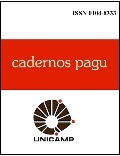Abstract
Analysis of the documentary Ôrí (Raquel Gerber, 1989). Developed over 11 years, between 1977 and 1988, the film takes the point of view of the black intellectual and militant Beatriz Nascimento, an inaugural presence within the scope of Brazilian documentary, which narrates from her ideas and intertwines these with events related to the black social movements in Brazil. The study contextualizes the making of the film and approaches it from two directions: through the meanings of Beatriz Nascimento's voice and her conceptual performance, centred on the ideas of transmigration and quilombo; and from the notion of cartographic montage, which compresses the long duration of the experience of making the film and gives a strong feeling of the relationship between the notion of place and blackness.
References
BRUNO, Giuliana. Atlas of Emotion: Journeys in Art, Architecture, and Film. New York, Verso, 2002. CORRIGAN, Timothy. The essay film: from Montaigne, after Marker. Nova Iorque, Oxford University Press, 2011.
DIAWARA, Manthia. The “I” Narrator in Black Diaspora Documentary. In: KLOTMAN, Phyllis; CUTLER, Janet. Struggles for representation: African American Documentary Film and Video. Bloomington, Indiana University Press, 1999.
GERBER, Raquel. O mito da civilização atlântica: Glauber Rocha, cinema, política e a estética do inconsciente. São Paulo, Vozes – Secretaria de Cultura de São Paulo, 1982.
GILROY, Paul. O Atântico Negro. Modernidade e dupla consciência. Rio de Janeiro, Editora 34 e Universidade Cândido Mendes – Centro de Estudos Afro-asiáticos, 2012.
HALL, Stuart. Cultural identity and diaspora. In: RUTHERFORD, J. Identity: community, culture and difference. Londres, Lawrence & Wishart, 1990.
______. Da diáspora: identidades e mediações culturais. Belo Horizonte, Editora UFMG, 2013.
HARAWAY, Donna. Saberes localizados: a questão da ciência para o feminismo e o privilégio da perspectiva parcial. cadernos pagu (5) 1995, pp.07-41. hooks, bell. Olhares negros: raça e representação. São Paulo, Elefante, 2019.
MBEMBE, Achille. Crítica da razão negra. Lisboa, Antígona, 2014.
NASCIMENTO, Abdias. O quilombismo: Documentos de uma militância Pan-Africanista. Rio de Janeiro e São Paulo, IPEAFRO e Perspectiva, 2019.
NASCIMENTO, Beatriz. Beatriz Nascimento, Quilombola e Intelectual: Possibilidade nos dias da destruição. Diáspora Africana, Editora Filhos da África, 2018.
RASCAROLI, Laura. The essay film: problems, definitions, textual commitments. Framework: The Journal of Cinema and Media, vol. 49, n. 02, outono 2008, pp.24-47.
RATTS, Alex. Eu sou Atlântica. Sobre a trajetória de vida de Beatriz Nascimento. São Paulo, Imprensa Oficial, 2006.

This work is licensed under a Creative Commons Attribution 4.0 International License.
Copyright (c) 2020 Cadernos Pagu


